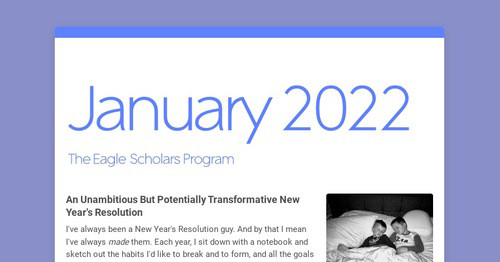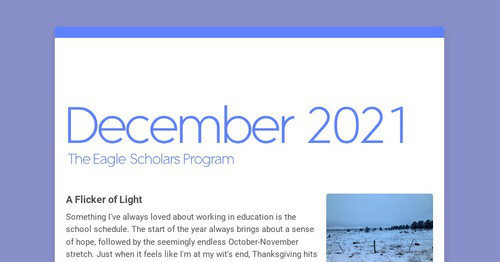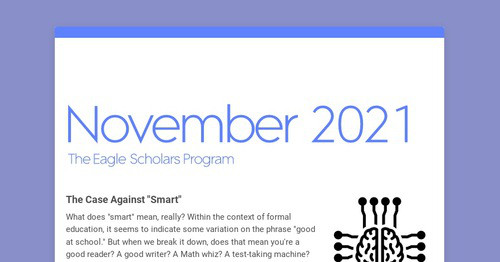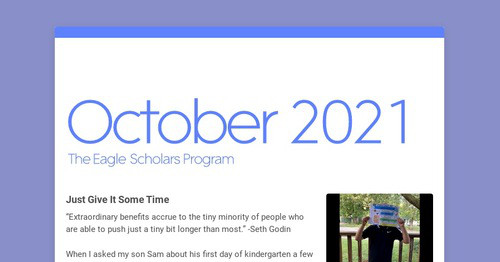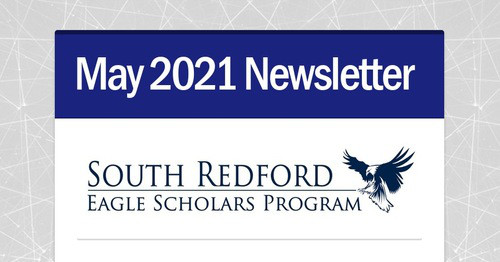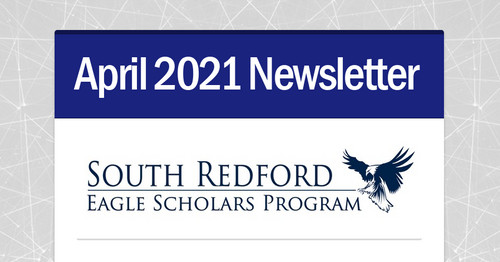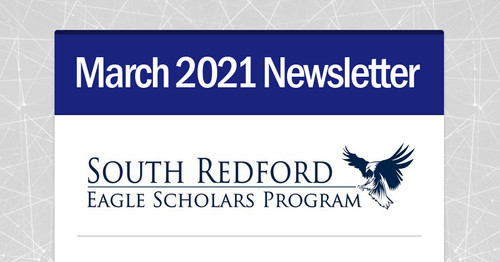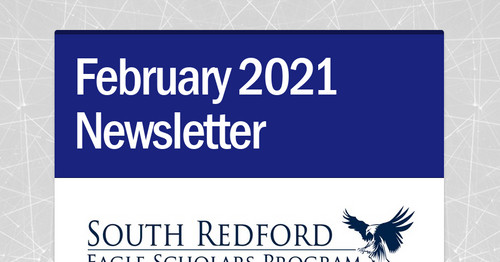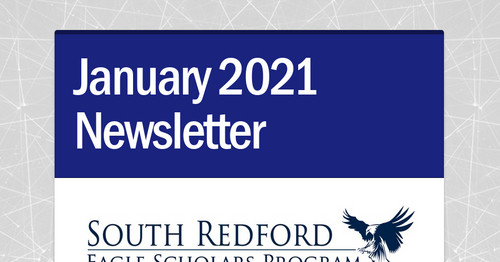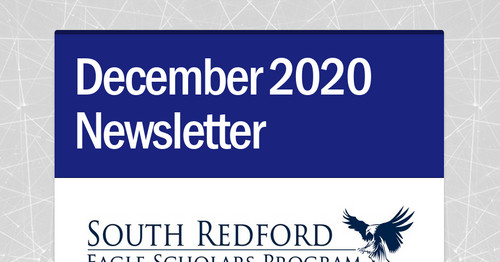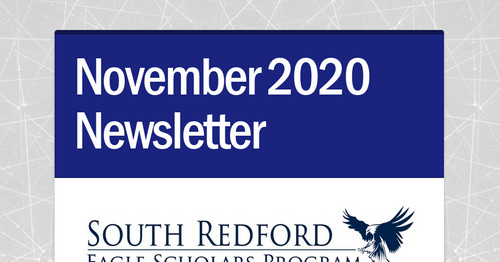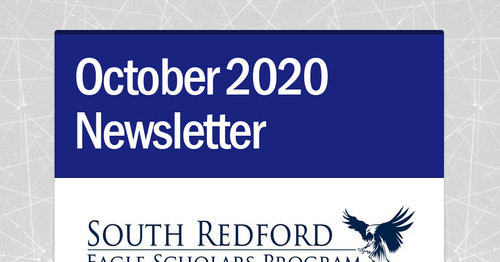
February 2022 Newsletter
South Redford Eagle Scholars Program
A Million Tabs Open All The Time
When I started my daily old man walks a few years ago, I looked forward to them because I could listen to a podcast while getting exercise. It felt like I was cheating; I was getting smarter and more fit at the same time. A few months ago, my old man ears started throbbing as a result of excessive headphone use on Zoom and phone calls.
Since then, when I go on walks, I just walk. No podcasts, no music, no phone calls. There's a lot of thinking (clearing out the day's frustrations, solving problems that seemed unsolvable), and plenty of observation (the trees, the houses, the dogs I'm secretly afraid of). For those 30-45 minutes each day, I become the ultimate monotasker.
Multitasking, on the other hand, is the standard. Talking on the phone while driving. Scrolling through Instagram while eating. Listening to music while working. Responding to emails in the middle of a Zoom meeting. Watching TV while folding laundry. Checking football scores while ordering food. Transferring money while crossing the street. Checking the weather while brushing teeth.
In fact, if we think about everything we do, it probably involves doing something else at the same time. We believe we've cracked the code on the limits of time: We can "get more done" when we do multiple things at once. Why wait to get home to buy those tickets when we can buy them at the stoplight? That frees up more time when we get home! So when we get home we can text our friend about the tickets we bought while we ask our kids about their day at school. That will free up some time to walk the dog a little earlier so we can catch our mom on a phone call before she goes to bed. And so on.
See where this is headed?
Multitasking is a fallacy. Our brains are designed to do one task at a time, and if we try to do more than one, both suffer.
I'm guilty too, but I'm trying to be more conscious. Even if I'm listening to the radio while I cook, I know I'm either missing some key content from the interview or dinner is not going to taste as good. When we do pizza and movie night, the kids ask to eat in front of the TV. Andrea and I, beaten down from a tough week, occasionally give in by rationalizing they'll go to bed earlier if we eliminate the 30-minute dinner slot. But it never works in our favor; they end up getting distracted by the movie, don't eat enough, then come out of their bed hungry at 9:00.
I can't totally blame us. There was a time when our only option was to do just one thing.
On road trips for example, we could read a book, listen to whatever my parents were listening to on the radio, take a nap, play a game, or talk to each other. It was really hard to look out the window and read a book at the same time. Monotasking was the default. Now it feels like the world is just one big browser with a million tabs open.
Our students assert that "Listening to music makes me concentrate better," and "I need my phone next to me in case I need to look up a definition." Mounds of research refute this; here's a study that concludes how, during a 3-hour study session, students who listened to music were distracted, on average, 35 times for a total of 25 minutes. If you study nine hours a week, that adds up to about 50 hours of distracted time over the course of a school year. So yes, you might be able to get schoolwork done while listening to music - in the same way someone might be able to drive home after drinking a six-pack - but it doesn't make it a good idea.
So what's a parent or educator to do?
First, we need to help shatter the myth of multitasking. Our kids need to understand that it simply does not work, no matter how much they want to convince themselves that it does. If they're getting the research from enough sources, it might start to sink in.
Second, let's help them become aware every time they choose to do two things at once. I'm not suggesting they can't listen to the radio while driving, but just being conscious of it can help in those moments when they default to multitasking mode. So for example, they can avoid answering the phone while driving with loud music on.
If we see them jam in Airpods as they crack open To Kill A Mockingbird, ask them if it's instrumental music or white noise (even better).
One strategy I've been using that has been super helpful at work: I turn my phone on silent and put it in my coat pocket, 15 feet away. It rings every hour, on the hour, all day, so when the alarm goes off I'm permitted to check my phone for a few minutes. Beginning Monday, students who work in my space will be required to do the same.
These are just some of the ways we can close the proverbial tabs. I'm sure you have some others. If so, please email them.
Now if you'll excuse me, I'm going to finish answering emails, fire off a few texts, close my tabs, close my computer, turn off my phone, turn off my Fitbit, and go for a walk.
SOURCES
1. "Multitasking: Switching costs." https://www.apa.org/research/action/multitask.
2. "What else do college students "do" while studying? An investigation of multitasking." https://www.sciencedirect.com/science/article/abs/pii/S0360131514000384.
UPPER RIGHT PHOTO: Sam always takes it one wing at a time when he's not in front of the TV.
Acceptance letters are rolling in for seniors!
Eagle Scholars Junior Meeting
WHERE: Thurston Media Center
WHY: SAT, College, AP classes, and more!
Thursday, Feb 17, 2022, 01:45 PM
Media Center
High School
For one-on-one support with the essay or your college search in general, sign up for a lunch meeting here. Please check out with Ms. Ogden in the front office.
FAFSA + CSS PROFILE - These two forms are critical to your financial aid process. All schools require the FAFSA; the CSS PROFILE is only required by these schools. It is in your best financial interests to complete FAFSA ASAP!
Letters of recommendation and transcripts must be requested through Naviance.
9th, 10th, 11th Graders:
For one-on-one support, sign up for a lunch meeting here. Details forthcoming about mandatory seminar meetings!
Middle School
Monday Eagle Scholars Study Sessions
Information:
What: Eagle Study Sessions, and opportunity to work on assignments with other scholars, ask for assistance while working.
Time: 3:10-4:10, no bus transportation, parent/guardian must commit to picking up at 4:10 or giving permission to walk home.
Location: 5C, Mrs. Wilson's Room
Sign Up Required Prior to Each Session: Look for an email from Mrs. Wilson the Friday prior to each study session. Students must be signed up via the Google form in order to attend. Study sessions are limited to the first 25 students, and the Google form will be available when emailed each Friday prior to a session until 4 pm on Sunday.
*Note* This models the homework clinic available on Mondays and Thursdays. If this session fills or you prefer to have your child attend 2 days a week, you are welcome to sign up for that instead.
FAQ
"The greatest threat to the state is not faction but distraction." --Aristotle
The South Redford Eagle Scholars Program
Email: rory.hughes@southredford.org
Website: eaglescholars.southredford.org
Location: 26249 Schoolcraft Avenue, Redford Charter Township, MI, United States
Phone: 313-444-2590
Facebook: facebook.com/eaglescholarsprogram



